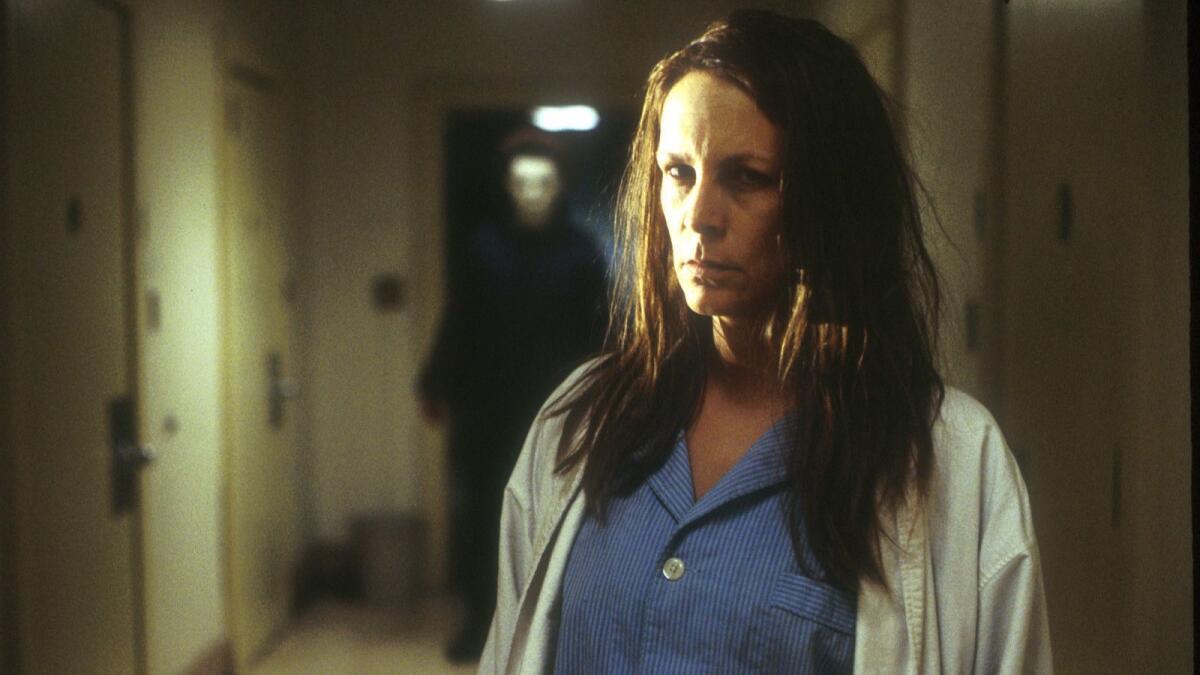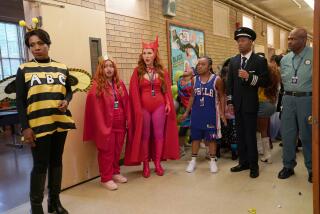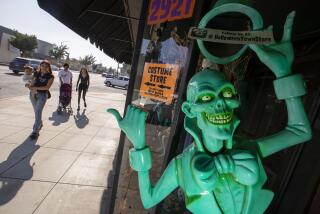‘Halloween’: A look back at the many lives (and deaths) of franchise heroine Laurie Strode
- Share via
The scream queen. It’s a title that’s been used time and time again in horror movies. The damsel in distress often has to fight back and become her own hero — and Laurie Strode is the template.
As originated in the “Halloween” franchise by Jamie Lee Curtis, Strode was the babysitter with a fighting spirit who had to fend off a sometimes supernatural menace-in-a-William-Shatner-mask killer named Michael Myers.
The John Carpenter-created franchise reveres Strode and Myers so much that it has continued to bring back both characters, whether they had been killed off in previous films or not. Events (including shared DNA) have been retconned, put into alternate timelines or just forgotten altogether as the series continues to remake itself.
Curtis reprises her role as Laurie Strode for the fifth time in 2018’s “Halloween,” opening nationwide Friday. However, despite her long and storied history with the franchise, the newest “Halloween” takes a fresh approach that ignores the previous sequels and instead serves as a a direct follow-up to the original 1978 film. In this version, Myers has been imprisoned in a mental institution for 40 years, and Strode has been waiting ... diligently preparing for his inevitable return.
Ahead of the release of the latest “Halloween,” The Times takes a look back at Laurie Strode’s many previous appearances, and how the resilient character survived — or didn’t — each time.
“Halloween” (1978)
Seventeen-year-old Laurie Strode (Curtis) is supposed to babysit Tommy Doyle (Brian Andrews) on Halloween — a normal occurrence in the small town of Haddonfield, Ill. But she keeps noticing a masked man around her neighborhood seemingly watching her… as she takes the kids trick-or-treating, and from the window of the Doyles’ home. His name, we eventually find out, is Michael Myers (Nick Castle), and he is an escaped mental patient who killed his teenage sister Judith when he was just an adolescent.
As Myers killed Strode’s friends throughout the neighborhood, he soon sets his sights on Laurie herself and the pair of kids she is protecting. She leads them to safety and is ultimately saved by Myers’ child psychiatrist, Dr. Sam Loomis (Donald Pleasence). Though Michael is shot at point-blank range multiple times and falls off the second story of a house, he disappears...
“Halloween II” (1981)
In this sequel that picks up directly after the end of the original, Strode is on her way to the hospital, wondering why Michael attacked her so relentlessly. She has a dream about being younger and meeting a boy that she doesn’t remember. When she wakes, she finds that Myers has killed many in the hospital as he continues to stalk her.
Loomis finds out that Michael and his sister Judith are actually Strode’s biological siblings. She was put up for adoption after the death of their parents. Loomis arrives at the hospital and, knowing that Michael Myers would not stop trying to kill Strode, causes an explosion that blows up Myers. Loomis, though, is also caught in the blast as Strode escapes.
“Halloween 4: The Return of Michael Myers” (1988)
The fourth film marks the next appearance by Strode, since 1982’s “Halloween III: The Season of the Witch” had nothing to do with Strode and Myers. But we see only a glimpse of Strode in a photograph, as it’s stated that the character died before the film. The focus is instead on Strode’s daughter, Jamie Lloyd (Danielle Harris), whose storyline continues in the Strode-less “Halloween 5: The Revenge of Michael Myers.” (And yes, this is when the series suddenly and inexplicably switched from using Roman numerals to Arabic numerals in its titles. It was just that kind of franchise.)
“Halloween H20: 20 Years Later” (1998)

Yes, it’s only 10 years since the fourth installment, but “20 Years Later” is meant to let you know that this movie is a direct sequel to the 1978 “Halloween.” The previous three films — including the ludicrous “Halloween: The Curse of Michael Myers,” which featured a young Paul Rudd as a grown-up Tommy Doyle and linked Myers’ origin story to a Druid curse — effectively didn’t exist.
In this “Halloween,” Curtis is back as a traumatized Laurie Strode who faked her own death so that she could go into hiding. She’s working as the headmistress of a boarding school in Northern California. She’s doing OK, supported by her guidance counselor boyfriend (Adam Arkin), son John (Josh Hartnett) and his girlfriend Molly Cartwell (Michelle Williams). But, of course, Myers finds her and murderous mayhem ensues. (Joseph Gordon-Levitt, LL Cool J and Curtis’ mother, Janet Leigh, are among the classier-than-usual supporting cast.) In the end, Strode kills the man she believes to be Myers.
“Halloween: Resurrection” (2002)

Three years after the events of the previous film, Strode has been confined to a psychiatric facility after finding out that she had mistakenly killed a man she only thought was her brother Michael Myers. She knows the real Myers is coming for her again, and he does. After a struggle, Strode hesitates to kill Myers, thinking it could be another ruse. It’s not. And, for the first time in the series’ history, Myers kills Strode by stabbing her and throwing her off a building.
The rest of the less-than-inspired film has to do with a bunch of college students (including Thomas Ian Nicholas, Sean Patrick Thomas and Katee Sackhoff) staying in the Myers house, appearing on an internet reality show called “Dangertainment.” It’s mostly killing by the numbers, and in the end, Myers is electrocuted and the house burns to the ground. But… he’s still not dead.
“Halloween” (2007)
Instead of making more sequels, the Weinstein Co.’s Dimension Films hired Rob Zombie to reboot the series. Zombie’s movie establishes early on that Strode (Scout Taylor Compton) is Michael’s sister Angel Myers, nicknamed “Boo.” His take is both a prequel and a remake, exploring more about Myers’ upbringing, even mentioning the trial where 10-year-old Myers is found guilty of murder.
The usual happens, with Myers — a physically more menacing version played by wrestler Tyler Mane — escaping the psych ward and seeking out Strode years later. He kills many, and gets to Strode, attempting to tell her that he’s her brother. Loomis (this time played by Malcolm McDowell) comes to help, but he’s not as effective as in the original. Instead, with Loomis’ gun, Strode shoots Myers point-blank in the face.
“Halloween II” (2009)

Zombie’s own sequel picks up directly where he left off, with a traumatized Strode (Taylor-Compton) getting assistance from a sheriff, while Myers is taken away in an ambulance. Of course, it crashes, and Myers wakes up.
Years later, Strode and Myers are both plagued by visions, and she slowly pieces together their sibling relationship. He inevitably tracks her down, and they face off in a shed. Myers is shot by police and falls on some sharp-edged farm equipment. Strode takes his mask and walks out with it on. Later, we see that she is now also having hallucinations of their mother.
“Halloween” (2018)
The newest installment in the series takes place 40 years after 1978’s first film, and ditches everything that’s happened on-screen since. Here, Strode has not gone to any asylums and there’s no mention of her being Myers’ sister. Instead, she’s been preparing all these years for his inevitable return. Myers is drawn to action in a very 2018 way — via podcasters — and makes his way to Strode while piling up kills as he goes.
As described by The Times’ Justin Chang: “ ‘Halloween’ treats its heroine’s lingering trauma with surprising emotional realism and only a hint of comic exaggeration. Laurie Strode has clearly never recovered from her terrifying ordeal.” Without spoiling the ending, it’s safe to assume that with three generations of Strode women on-screen — daughter Karen (Judy Greer) and granddaughter Allyson (Andi Matichak) join Curtis as Laurie — Myers faces more than he ever has before.
ALSO:
Forty years later, the original haunts of ‘Halloween’ still scare up a crowd in South Pasadena
A timeline of horror: Influential moments from ‘Nosferatu’ to ‘Halloween’ to ‘Paranormal Activity’
Special report: The age of horror
Follow me on Twitter: @Storiz
More to Read
Only good movies
Get the Indie Focus newsletter, Mark Olsen's weekly guide to the world of cinema.
You may occasionally receive promotional content from the Los Angeles Times.











